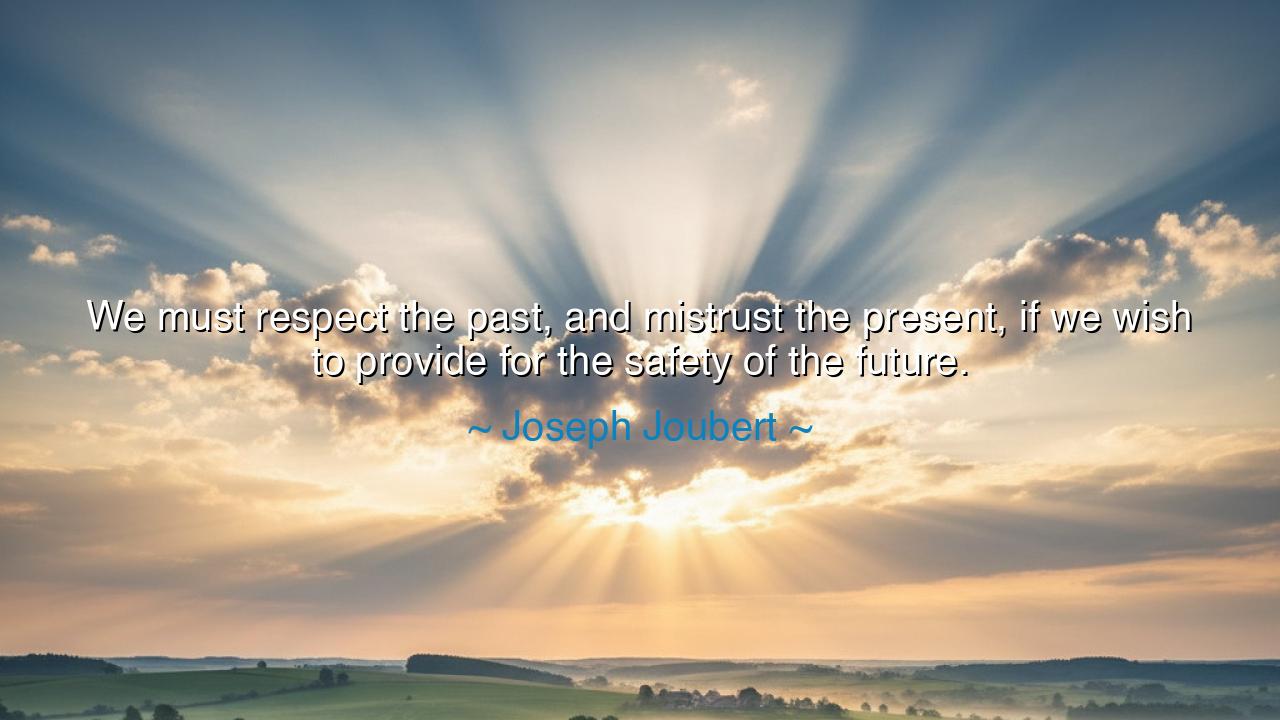
We must respect the past, and mistrust the present, if we wish to
We must respect the past, and mistrust the present, if we wish to provide for the safety of the future.






"We must respect the past, and mistrust the present, if we wish to provide for the safety of the future." These words, spoken by Joseph Joubert, are a call to remember the lessons of history, to reflect on the present with a critical eye, and to ensure that we are not blinded by the immediate to the point of sacrificing the future. Joubert’s wisdom echoes through the ages, for it speaks to the timeless struggle between what has come before, what is happening now, and what is yet to come. It is a message that invites us to acknowledge the strength of the past while questioning the path we are walking today, so that we might safeguard the future we leave behind.
In the ancient world, the importance of respecting the past was integral to the foundation of great civilizations. The Romans, for example, believed deeply in the idea of ancient wisdom. Their civic virtues and laws were inspired by the teachings of those who had come before them. The Senate of Rome, made up of men who were entrusted with decisions for the state, was founded on the principle that only through knowledge of past successes and failures could good governance be achieved. Similarly, the Greek philosophers like Plato and Aristotle wrote at length on the importance of learning from history, ensuring that the wisdom of the past could guide the actions of their societies. In these ancient cultures, it was believed that to disrespect the past was to doom the present and future to chaos.
Joubert’s quote also draws a powerful lesson about mistrusting the present. This does not mean rejecting the present outright, but rather approaching it with the wisdom of someone who understands the impermanence of things and the fragility of the present moment. Confucius, the revered philosopher of ancient China, taught that one should not be swayed by the temporary emotions of the present but instead should be guided by virtue and wisdom, which are often forged over time. In his teachings, he urged the people to reflect on the lessons of history, for the present was but a fleeting moment, and only those who were rooted in the timeless truths of the past could hope to build a lasting future.
Consider, too, the example of King Solomon, often revered for his wisdom. Solomon did not act impulsively based on the circumstances of his time. He sought counsel and guidance from the ancient laws and the wisdom of his forebears, understanding that the future of his kingdom depended on the deliberate actions of the present. When Solomon built his temple, it was not only a symbol of his reign but also a physical representation of the lessons passed down to him—a connection to the divine wisdom of those who had gone before him. It was this deep respect for the past that allowed him to make wise decisions that ensured the prosperity of his kingdom for generations.
In more recent history, we see the relevance of Joubert’s words in the struggles faced by nations in times of war. When the great empires of Europe collided in the First and Second World Wars, it became clear that the blind trust in the present, without learning from past conflicts, led to devastation. Winston Churchill, who led Britain through some of the darkest hours of World War II, understood the importance of not merely reacting to the immediate threats but of learning from the past to shape the course of the future. His famous speeches and decisions were rooted in a deep respect for the lessons of history—lessons that told him how easily the world could fall into chaos if the mistakes of the past were not learned from.
The lesson Joubert imparts to us is that we must, first and foremost, honor the past, for it holds within it the collective wisdom and hard-earned truths of those who have lived before us. But we must also be cautious of the present, for it is ever-changing and often clouded by emotion and the noise of the moment. Only by mistrusting the present and questioning it with clarity can we hope to ensure a safe future. History is replete with examples of societies that have collapsed not because they did not have the means to prosper, but because they neglected the teachings of the past and blindly followed the currents of their time.
The practical application of this wisdom calls us to study the past, to learn its lessons, and to reflect on the patterns of history. It also calls us to question the decisions we make today, understanding that hasty actions often lead to regret. When faced with choices, especially those that affect the future, let us remember that the decisions we make now must be informed by the past and tempered with the caution that comes from wisdom, not just the desire to act. For in doing so, we ensure that we are not merely reacting to the present, but actively shaping a future that respects the past and provides safety for those who will follow in our footsteps.
In conclusion, remember the words of Joubert and take them into your life: respect the past, for it is a treasure trove of wisdom, and mistrust the present, for it can be fleeting and deceptive. Let your actions be guided by the lessons of history, for in doing so, you will pave the way for a future that is not only safe but wise and just.






AAdministratorAdministrator
Welcome, honored guests. Please leave a comment, we will respond soon